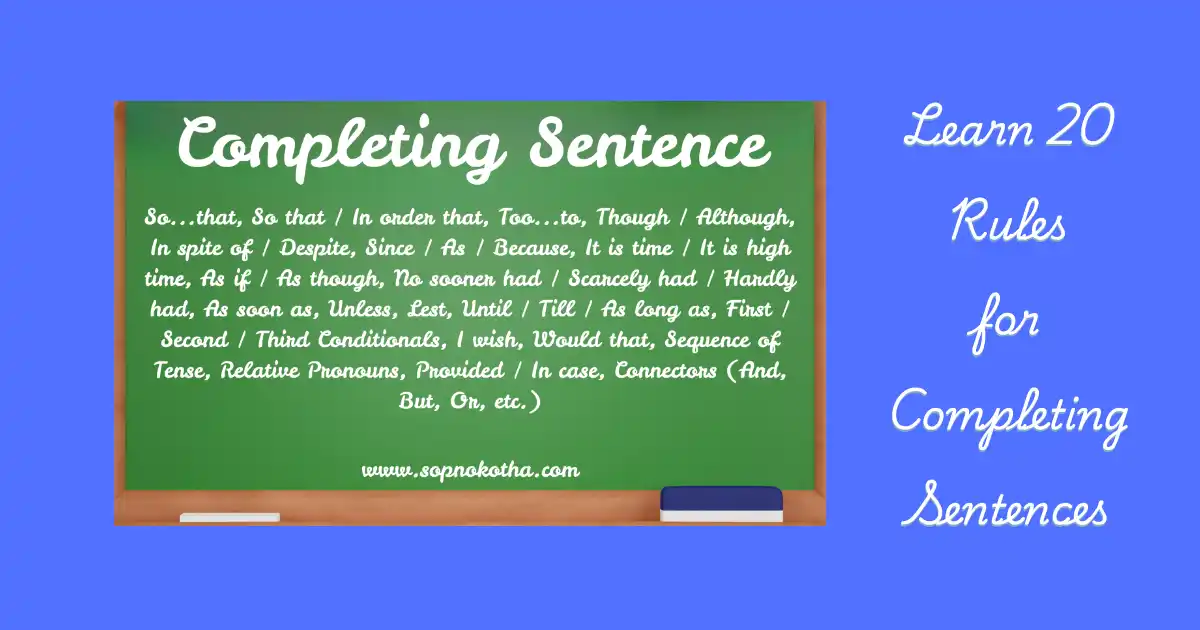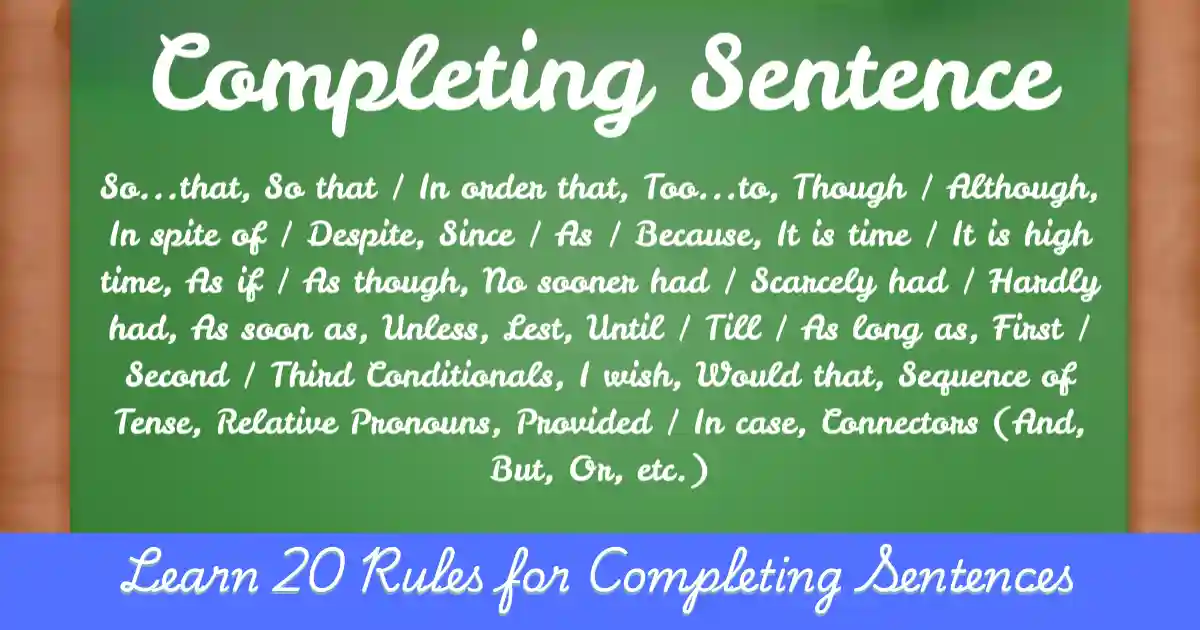Completing sentence is an essential skill in English grammar, especially for students preparing for exams like HSC, SSC, and other competitive tests. This topic not only strengthens your command over sentence structure but also helps you write and speak more accurately and fluently.

In exams, completing sentences tests your understanding of clauses, tenses, connectors, conditionals, and relative pronouns, all key components of standard English usage.
Top 19 Essential Phrases for HSC Students to Complete Sentences
Completing Sentence – All the rules at a glance:
So…that, So that / In order that, Too…to, Though / Although, In spite of / Despite, Since / As / Because, It is time / It is high time, As if / As though, No sooner had / Scarcely had / Hardly had, As soon as, Unless, Lest, Until / Till / As long as, First / Second / Third Conditionals, I wish, Would that, Sequence of Tense, Relative Pronouns, Provided / In case, Connectors (And, But, Or, etc.)
Completing Sentence – Rule 1: So…that (এতটাই…যে):
Structure: Subject + verb + so + adjective + that + subject + cannot/could not + base verb
Examples:
He is so dull that he cannot understand anything.
She was so sick that she could not attend the class.
They are so poor that they cannot buy books.
Water is so vital an element that we cannot survive without it.
The weather was so cold that we stayed indoors all day.
Exercises:
The movie was so boring that ___________.
The student was so brilliant that ___________.
The hill was so steep that ___________.
She is so generous that ___________.
The problem was so difficult that ___________.
Completing Sentence – Rule 2: So that / In order that / That (যাতে):
Structure: Main clause + so that/in order that + subject + can/may/could/might + base verb
Examples:
We study hard so that we can succeed.
They left early so that they could catch the bus.
I exercise regularly in order that I may stay healthy.
He took extra lessons so that he might improve.
She saves money so that she can buy a car.
Exercises:
We take precautions so that ___________.
He learns English in order that ___________.
They practice daily so that ___________.
The teacher speaks clearly so that ___________.
I revised the topic in order that ___________.
Completing Sentence – Rule 3: Too…to (এতটাই…যে না):
Structure: Subject + verb + too + adjective/adverb + to + base verb
Examples:
The room is too dark to study.
He is too tired to work.
The soup is too salty to eat.
The boy is too young to go alone.
She is too lazy to clean her room.
Exercises:
The bag is too heavy to ___________.
He is too slow to ___________.
This road is too narrow to ___________.
The question is too tricky to ___________.
She is too shy to ___________.
Completing Sentence – Rule 4: Though / Although (যদিও):
Structure: Though/Although + subject + verb, subject + verb
Examples:
Though it was raining, we went outside.
Although he tried his best, he failed.
Though she is rich, she lives simply.
Although he is young, he is wise.
Though they were tired, they continued working.
Exercises:
Though the price is high, ___________.
Although the road is rough, ___________.
Though he missed the bus, ___________.
Although it was late, ___________.
– Though the room was noisy, ___________.
Completing Sentence – Rule 5: In spite of / Despite (সত্ত্বেও):
Structure: In spite of/Despite + noun/verb-ing, subject + verb
Examples:
In spite of his illness, he went to school.
Despite the rain, the match continued.
In spite of being poor, he is honest.
Despite his efforts, he failed.
In spite of heavy traffic, she arrived on time.
Exercises:
In spite of his weakness, ___________.
Despite her anger, ___________.
In spite of the noise, ___________.
Despite the cold weather, ___________.
In spite of the difficulty, ___________.
Completing Sentence – Rule 6: Since / As / Because (কারণ):
Structure: Since/As/Because + subject + verb, subject + verb
Examples:
Since he was late, he missed the bus.
As she was ill, she didn’t go out.
Because it rained, we stayed indoors.
Since the power was off, we couldn’t use the fan.
As the baby was crying, the mother comforted him.
Exercises:
Since I forgot the key, ___________.
As he worked hard, ___________.
Because the internet was slow, ___________.
Since it is Friday, ___________.
As we have a test tomorrow, ___________.
Completing Sentence – Rule 7: It is time / It is high time (এখন সময় হয়েছে):
Structure: It is (high) time + subject + past verb (V2)
Examples:
It is high time we acted responsibly.
It is time you went to bed.
It is high time he stopped smoking.
It is time they cleaned the room.
It is high time we took action.
Exercises:
It is time you ___________.
It is high time she ___________.
It is time we ___________.
It is high time the government ___________.
– It is time I ___________.
Completing Sentence – Rule 8: As if / As though (যেন):
Structure: Subject + verb + as if/as though + subject + were/past verb
Examples:
He behaves as if he were the boss.
She talks as though she knew everything.
He reacted as if he had seen a ghost.
They acted as if nothing had happened.
The boy looked as if he had cried.
Exercises:
She cried as though ___________.
He walked away as if ___________.
They speak as if ___________.
The man shouted as though ___________.
He smiled as if ___________.
Completing Sentence – Rule 9: No sooner had / Scarcely had / Hardly had (একসাথে দুটি কাজ):
Structure: No sooner had + subject + V3 + than + subject + V2; Scarcely/Hardly had + subject + V3 + when + subject + V2
Examples:
No sooner had I entered the room than the bell rang.
– Scarcely had we started the class when it began to rain.
Hardly had she left when the guests arrived.
No sooner had he finished eating than he fell asleep.
Scarcely had the sun risen when they started the journey.
Exercises:
No sooner had the movie started than ___________.
Hardly had he spoken when ___________.
Scarcely had the teacher come when ___________.
No sooner had I reached school than ___________.
Hardly had they arrived when ___________.

Mastering Conjunctions: 3 Types, Powerful Uses & Examples
Completing Sentence – Rule 10: As soon as (যেই না):
Structure: As soon as + subject + verb, subject + verb
Examples:
As soon as I reached home, it started to rain.
As soon as the bell rang, the students left.
As soon as the teacher entered, we stood up.
As soon as she saw me, she smiled.
As soon as the class ended, we went out.
Exercises:
As soon as he saw the snake, ___________.
As soon as the exam was over, ___________.
As soon as I opened the book, ___________.
As soon as we heard the news, ___________.
As soon as the dog barked, ___________.
Completing Sentence – Rule 11: Unless (যদি না):
Structure: Unless + subject + verb, subject + verb
Examples:
- Unless you work hard, you will fail.
- Unless he comes, we won’t start.
- Unless she apologizes, I won’t forgive her.
- Unless we leave now, we will miss the train.
- Unless they invite me, I won’t attend.
Exercises:
- Unless you hurry, ___________.
- Unless we take action, ___________.
- Unless she studies, ___________.
- Unless he helps us, ___________.
- Unless the weather improves, ___________.
Rule 12: Lest (না যেন)
Structure: Subject + verb + lest + subject + should + base verb
Examples:
- Read attentively lest you should fail.
- Walk carefully lest you should fall.
- Speak softly lest you should wake the baby.
- Start early lest you should miss the bus.
- Be cautious lest you should make a mistake.
Exercises:
- Work hard lest ___________.
- Drive slowly lest ___________.
- Be careful lest ___________.
- Take notes lest ___________.
- Speak gently lest ___________.
Completing Sentence – Rule 13: Until / Till / As long as (যতক্ষণ না):
Structure: Subject + verb + until/till/as long as + subject + verb
Examples:
- Wait here until I come back.
- He won’t stop till he succeeds.
- Stay here as long as you want.
- They danced until midnight.
- I won’t leave till you forgive me.
Exercises:
- Stay awake until ___________.
- Wait outside till ___________.
- Remain silent as long as ___________.
- Don’t go until ___________.
- Keep working till ___________.
Completing Sentence – Rule 14: Conditional Sentences (শর্তযুক্ত বাক্য):
First Conditional:
Structure: If + present + will/can/may/must + base verb
- If you study, you will pass.
- If it rains, we may stay home.
Second Conditional:
Structure: If + past + would/could/might + base verb
- If I had money, I would help you.
- If he were rich, he could travel the world.
Third Conditional:
Structure: If + had + V3, would have + V3
- If I had known, I would have helped.
- If they had tried, they could have succeeded.
Exercises:
- If you invite me, ___________.
- If I were you, ___________.
- If she had studied, ___________.
- If it snows tomorrow, ___________.
- If they had called earlier, ___________.
Completing Sentence – Rule 15: I wish (আশা করি / ইচ্ছা):
Structure: I wish + subject + were/had/past verb
Examples:
- I wish I were a bird.
- I wish I had a car.
- I wish he knew the answer.
- I wish they had helped me.
- I wish it were Sunday.
Exercises:
- I wish I ___________.
- I wish we ___________.
- I wish he ___________.
- I wish she had ___________.
- I wish it ___________.
Completing Sentence – Rule 16: Would that (হায় যদি…):
Structure: Would that + subject + had + V3
Examples:
- Would that I had seen him earlier.
- Would that she had told the truth.
- Would that we had met before.
- Would that he had taken the opportunity.
- Would that they had helped me.
Exercises:
- Would that I ___________.
- Would that he ___________.
- Would that she ___________.
- Would that they ___________.
- Would that you ___________.
Completing Sentence – Rule 17: Sequence of Tenses (কাল অনুযায়ী ক্রম):
Examples:
- When it is rainy, we stay indoors.
- He had left before I arrived.
- She was singing while he was playing.
- They will come when the party starts.
- He said that he would come.
Exercises:
- She said that she ___________.
- He had eaten before ___________.
- When I arrived, they ___________.
- If it rains, we ___________.
- While she was studying, ___________.
Completing Sentence – Rule 18: Relative Pronouns (যে/যাকে/যার জন্য):
Words: who, whom, whose, which, that, when, where
Examples:
- I helped the boy who was crying.
- This is the book that I borrowed.
- He is the man whose car was stolen.
- The house where I was born is nearby.
- I remember the day when we met.
Exercises:
- The girl who ___________.
- The place where ___________.
- The man whose ___________.
- The time when ___________.
- The boy whom ___________.
Completing Sentence – Rule 19: Provided / In case (যদি…তাহলে / যদি দরকার হয়):
Examples:
- I shall go to college provided you come with me.
- I carried an umbrella in case it rained.
- She will help you provided you ask politely.
- Take medicine in case you catch a cold.
- You can come provided you follow the rules.
Exercises:
- I will help you provided ___________.
- Take some extra food in case ___________.
- You may go provided ___________.
- Carry a jacket in case ___________.
- She will agree provided ___________.
Completing Sentence – Rule 20: Connectors (সংযোজক শব্দ):
Words: and, but, or, yet, however, otherwise
Examples:
- He is poor but honest.
- Read attentively or you will fail.
- She is rich and generous.
- He was tired, yet he continued.
- Hurry up; otherwise, you’ll be late.
Exercises:
- He studied hard but ___________.
- Be careful or ___________.
- She is talented and ___________.
- The road is rough; however, ___________.
- Try again; otherwise, ___________.

Read more – Completing Sentence: All 14 Rules & Examples
Completing Sentence – Grand Exercise:
01.
(a) Trees are essential for our existence. So, we should ————.
(b) English is an international language. ———— you cannot get a good job.
(c) Corruption is an obstacle to our national development. It is high time ————.
(d) My childhood was full of joys and happiness. I wish ————.
(e) Mobile phone is a wonder of modern science. But ————-.
(f) He cannot run the business. So, he should ————–.
(g) He confessed that ————-. So, I forgave him.
(h) The students could not memorise the poem. It was too difficult ————-.
(i) Since there was no more question to discuss, ————–.
(j) Female education is a crying need for our country. It is a good sign that nowadays ————-.
02.
(a) 21st February is a red-letter day in our life because ———–. It is our Mother Language Day.
(b) Once there was a farmer who had three sons. They were so lazy that ————.
(c) I have to meet Raihan. Do you know where ————?
(d) It is high time you ———–. It is detrimental to health.
(e) English is an international language. If you want to go abroad for higher studies —————.
(f) The bee is one of the busiest insects. It flies from flower to flower to ——————.
(g) My friend lived in New Zealand. It is many years since ——————-.
(h) We must grow the habit of getting up early in the morning. The sooner we get up ——————.
(i) There goes the proverb ‘United we stand, divided we fall’. Unless we are united —————-.
(j) Our country is beset with many problems. We all should come forward with a view to —————.
03.
(a) Last night I did not have a sound sleep. I feel sleepy ———– TV.
(b) You cannot handle such a ———– if you don’t have prior experience in teaching.
(c) If the driver had been more careful, ————- the fatal accident.
(d) We were supposed to start our journey the next day. But it was so hot that —————.
(e) A village market is one of the many attractions of country life. It is a public place where ——————.
(f) The box is very heavy. Are you strong enough ——————-?
(g) Begging is not a profession. It is most disreputable. We must not —————-.
(h) Whenever he speaks in English ————-. But it is natural that we learn through mistakes.
(i) The station is not far away from here. It will take you five minutes ————-.
(j) One should bear in mind that forming bad habit is easy to do but —————-.

